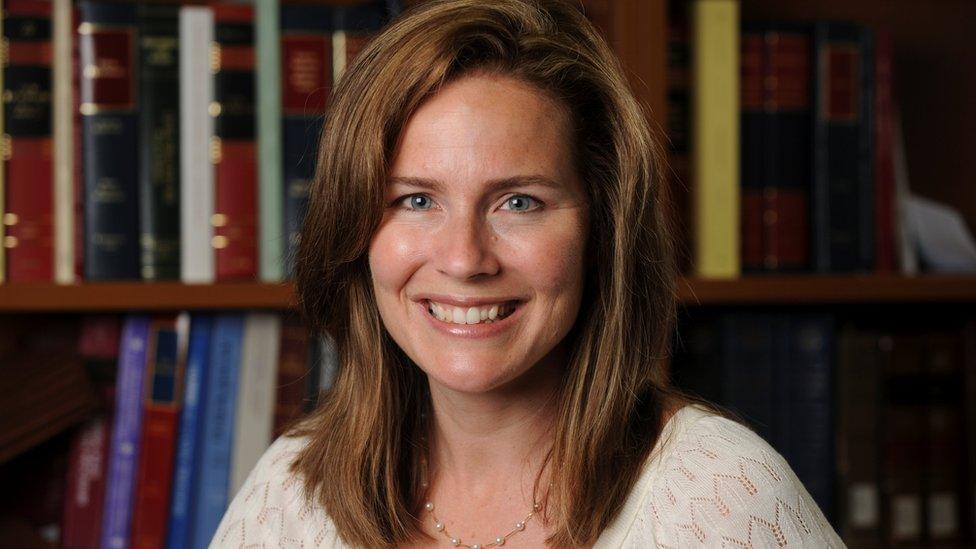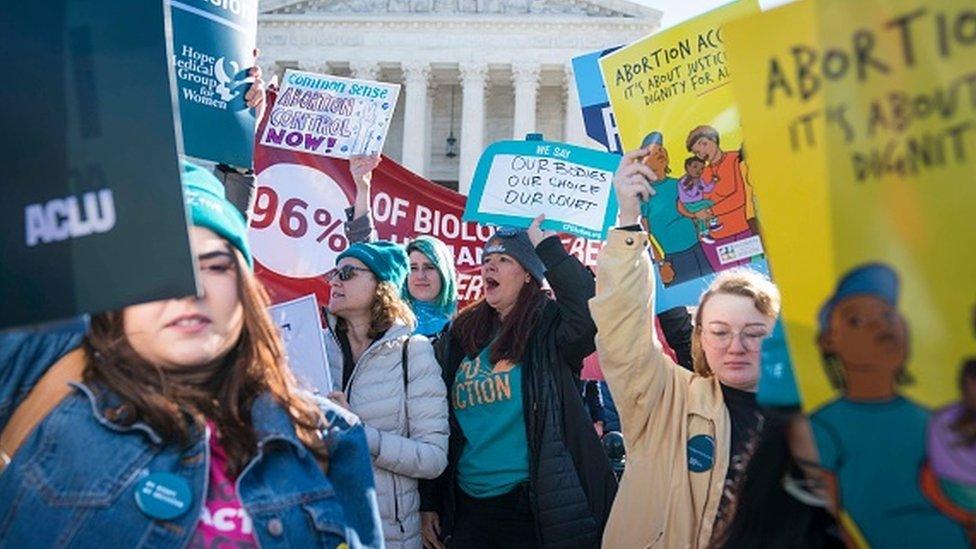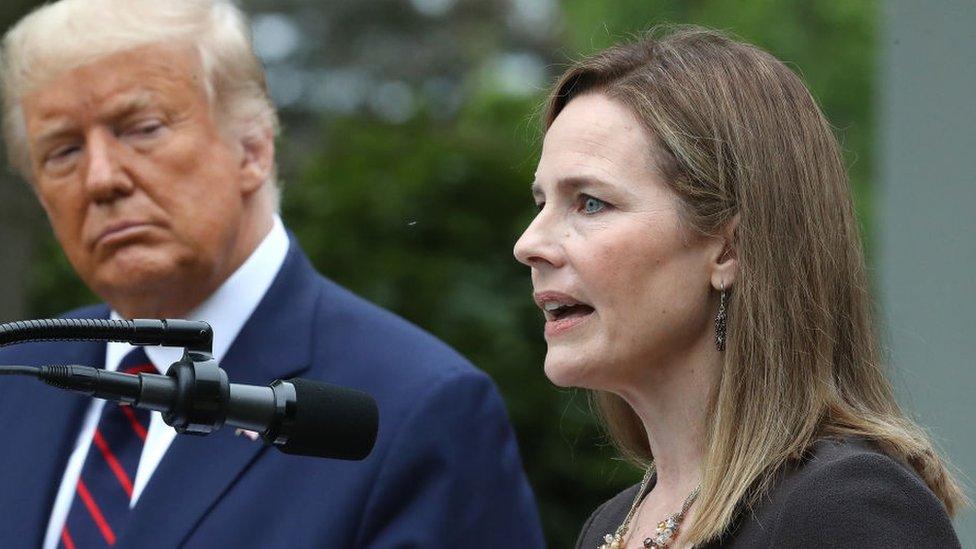Amy Coney Barrett: Trump nominee testifies in Supreme Court hearing
- Published
Amy Coney Barrett: 'Courts not designed to solve every problem'
US Supreme Court nominee Amy Coney Barrett has said she is "honoured and humbled" to be President Trump's pick for a place in the top court during a tense Senate confirmation hearing.
The 48-year-old conservative jurist vowed to judge legal cases impartially.
But her selection so close to the 3 November presidential election has sparked a fierce political battle.
The panel's Republican chairman has predicted a "contentious week" of questioning ahead.
Judge Barrett's approval would cement a 6-3 conservative majority on the nine-member court, altering the ideological balance of the court for potentially decades to come.
Mr Trump picked Judge Barrett to replace liberal Justice Ruth Bader Ginsburg, who died last month aged 87.
"I have been nominated to fill Justice Ginsburg's seat, but no one will ever take her place," Mrs Barrett told senators in her opening statement on Monday. "I will be forever grateful for the path she marked and the life she led."
However, conservative views and decisions from the bench she has delivered as a judge on the Seventh Circuit Court of Appeals - of which much can be seen as opposing to the philosophy of the late Justice Ginsburg - will be heavily scrutinised by Democrats who oppose her confirmation.
The Republicans - who currently hold a slim majority in the US Senate, the body that confirms Supreme Court judges - are trying to complete the process before Mr Trump takes on Democratic rival Joe Biden in the election.
The court's nine justices serve lifetime appointments, and their rulings can shape public policy on everything from gun and voting rights to abortion and campaign finance.

Republicans confident amid political brawl

Supreme Court confirmation hearings are always high political drama. With a presidential election just three weeks away and the coronavirus pandemic still upending American life, however, the current environment in the US Senate Judiciary Committee is particularly volatile.
During opening remarks, Democrats demonstrated that they want Amy Coney Barrett's hearings to be about the Republican rush to seat a new justice before the elections and the possibility that she could be a deciding vote to strike down the increasingly popular healthcare reforms passed under Democratic President Barack Obama.
To drive this point home, aides placed photos of Americans who have benefited from "Obamacare" on easels around the room as the Democratic senators began speaking.
Democrats are avoiding the divisive topic of abortion, which motivates political adversaries as much as it rallies allies, for what they feel is more favourable political ground.
Republicans, for their part, want these confirmation hearings to be business as usual. They know it will be a partisan brawl, but they've already won two Supreme Court confirmation fights during Donald Trump's presidency.
The circumstances may be unusual, but if they stick together - and focus on Judge Barrett's professional and personal qualifications - they feel confident they can prevail.
Read more: Anthony's full analysis

Who is Amy Coney Barrett?
favoured by social conservatives due to record on issues like abortion and gay marriage
a devout Catholic but says her faith does not influence her legal opinion
is an originalist, which means interpreting US Constitution as authors intended, not moving with the times
lives in Indiana, has seven children including two adopted from Haiti

What did Judge Barrett say?
In what is effectively an interview for the job, the confirmation hearing gave Judge Barrett a chance to explain her legal philosophy and qualifications for the lifetime post.
In her remarks to the committee, she thanked President Trump for "entrusting me with this profound responsibility", which she called the "honour of a lifetime".
She discussed the importance of her family and how her parents prepared her for a "life of service, principle, faith, and love".
Amy Coney Barrett: "I will meet the challenge with both humility and courage"
The statement also paid tribute to judges she has worked with, including former conservative Supreme Court Justice Antonin Scalia.
Justice Scalia's reasoning "shaped me", she said.
"His judicial philosophy was straightforward: A judge must apply the law as written, not as the judge wishes it were."
Judge Barrett also argued that elected politicians make "policy decisions and value judgments", not Supreme Court justices.
"In every case, I have carefully considered the arguments presented by the parties, discussed the issues with my colleagues on the court, and done my utmost to reach the result required by the law, whatever my own preferences might be," she said.
What were the opening exchanges?
Republicans praised Mrs Barrett and defended the legitimacy of confirming the judge, despite arguments from Democrats that the hearings should wait until after the election.
Lindsey Graham, the Republican committee chairman, said the judge belonged "in a category of excellence, something the country should be proud of".
However, the top Democrat Dianne Feinstein argued that Mrs Barrett's appointment could pose a direct threat to Obamacare, a public health insurance scheme the Trump administration is attempting to challenge before the Supreme Court.
"Simply put, I do not think we should be moving forward on this nomination," Senator Feinstein said, calling for the hearings to be delayed until after the election.
Senator Kamala Harris, the 2020 Democratic vice-presidential nominee, echoed her colleagues, focusing her criticism of Mrs Barrett's nomination on the potential that she could overturn Obamacare.
Judge Barrett's nomination puts "in jeopardy" Justice Ginsburg's "legacy and the rights she fought so hard to protect," Ms Harris said.
"By replacing Justice Ruth Bader Ginsburg with someone who will undo her legacy, President Trump is attempting to roll back Americans' rights for decades to come," she said. "Every American must understand that with this nomination, equal justice under law is at stake."
Vermont Democrat Patrick Leahy the Republicans' attempt to fill Ginsburg's seat "just one hour after the announcement of her death" was "shameful".
Iowa Republican Chuck Grassley predicted Democrats would "rustle up baseless claims and scare tactics" to smear the nominee and "outright disparage her religious beliefs".
What's the confirmation process?
Mrs Barrett will face questions from members of the Judiciary committee in hearings that will last through the week. After the hearings end, any committee member can require an additional week before the formal panel vote on whether to present the nomination for confirmation before the full Senate. It is not clear if the members will be able to vote remotely.
If she passes the committee, the full Senate will vote to confirm or reject Judge Barrett's nomination.
Republicans already appear to have the 51 votes needed to get Judge Barrett confirmed.

Judge Barrett clerked for the late Justice Antonin Scalia
Senate majority leader Mitch McConnell has vowed to hold a confirmation vote before the presidential election.
Barring a surprise, Democrats seem to have few options to prevent her from gliding through the Senate to the Supreme Court bench.
Why is Judge Barrett's nomination so controversial?
Since Ginsburg's death from cancer on 18 September, Republican senators have been accused of hypocrisy for pressing ahead with a Supreme Court nomination during an election year.
In 2016, Mr McConnell refused to hold hearings for Democratic President Barack Obama's nominee for the court, Merrick Garland.
2016 v 2020: What Republicans said about choosing a Supreme Court justice in an election year
The nomination, which came 237 days before the election, was successfully blocked because Republicans held the Senate and argued the decision should be made outside of an election year.
This time around, Mr McConnell has lauded Judge Barrett's nomination.
Democrats say the Republicans should stand by their earlier position and let voters decide. However, Republicans counter that the Democrats have also changed their stance since 2016.
Mr Biden has called Mr Trump's efforts to appoint a justice an "abuse of power".
He has so far refused to comment on whether the Democrats would attempt to add seats to the Supreme Court - dubbed "court packing" - if he won the presidential election.

Battle over Supreme Court

- Published11 October 2020
- Published27 September 2020

- Published27 September 2020
